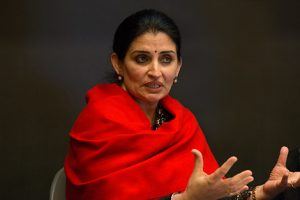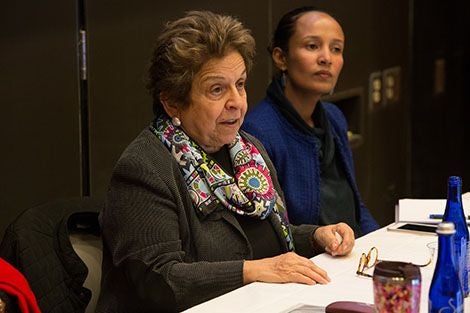November 29, 2017 – When Donna Shalala decided to tackle smoking during her tenure as Secretary of Health and Human Services under President Bill Clinton, she knew that it was going to take more than a new ad campaign to get rates down. So, with data showing that keeping kids away from tobacco is the key–9 out of 10 smokers start before age 18—Shalala and her colleagues crafted a strategy to hit the problem from multiple angles, including restricting kids’ access to cigarettes and launching targeted legal battles.
Shalala shared lessons from this and other public health campaigns as part of a panel discussion at Harvard T.H. Chan School of Public Health on Life Saving Leadership and the Art of Health Policymaking. The November 15 event was sponsored by the Takemi Program in International Health.
Shalala was on campus as a Richard L. and Ronay A. Menschel Senior Leadership Fellow, and was joined at the event by Takemi Fellows Mahlet Habtemariam, former director general for the Ministry of Health in Ethiopia, and Sujata Saunik, principal secretary in the government of Maharashtra, India.

Moderator Jesse Bump, executive director of the Takemi Program and lecturer on global health policy, said that while examples of bad leadership abound in the news, the behind-the-scenes work of health policymaking can provide examples of leadership that is truly lifesaving.
Shalala’s tobacco-control efforts highlight the importance of effectively framing an issue, Bump said. People across the political spectrum value kids’ health, and support initiatives to prevent them from smoking.
She advised others who are tackling big public health problems to go at them from every direction. “It’s the only way you can move public health issues,” she said. “I don’t know of any public health campaign that succeeded on public service ads alone.”
During her eight-year tenure in Ethiopia’s Ministry of Health, Habtemariam led the development of the country’s first national strategic action plan for the prevention and control of non-communicable diseases (NCDs), and the first national cancer control plan. Her strategy for getting the NCD plan passed and implemented included working to find allies in government ministries and champions in parliament.
For public health professionals in India—home to 1.2 billion people and 22 official languages—crafting policies that can balance the needs of people across cultures can be an immense challenge, Saunik said.
Another challenge is knowing when to let go of a program that does not receive support, she said. Chief among her disappointments was an effort to ban public spitting, which can spread infectious disease. Although some improvement was achieved by installing spittoons near garbage cans, the ban was found to be too difficult to enforce. But Saunik has found success with other programs, including plans to mitigate the health effects of extreme heat and to improve newborn survival in intensive care units by promoting the use of clean sheets.
Photos: Sarah Sholes
